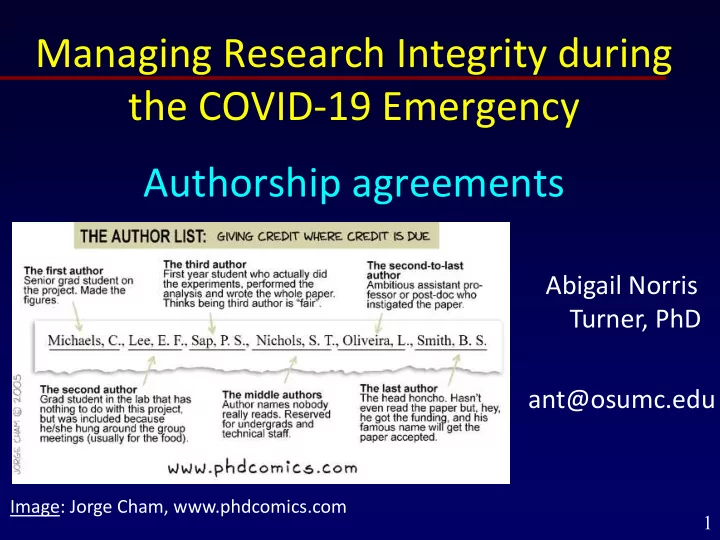

Managing Research Integrity during the COVID-19 Emergency Authorship agreements Abigail Norris Turner, PhD ant@osumc.edu Image: Jorge Cham, www.phdcomics.com 1
Outline • History and purpose of authorship agreements • OSU guidelines • Best practices • What goes wrong in ordinary circumstances? • How does COVID-19 make authorship harder? • What can we do now to reduce problems? “It’s a great time to work on your papers!” 2
OSU Authorship guidelines • Emerged in the wake of research misconduct • Development was an interdisciplinary and iterative process some compromises • Non-binding “Author Contributions & Disclosure Worksheet” – Meant to protect various parties • Likely that having the discussion within teams is valuable, even if the worksheet is not used • Also outlines a process for authorship disputes • https://library.osu.edu/sites/default/files/2019- 09/osu_authorship_guidelines.pdf 3
Best practices • Accurate disclosure of all potential conflicts of interest • Accurate disclosure of all funding supporting the work • Accurate disclosure of the specific contributions of each author – Use the OSU Authorship and Contribution worksheet to document individual contributions – Use OrcID (or a similar unique identifier) perpetual digital identifier unique to an individual – Utilize collaboration agreements that talk about authorship expectations 4
Unacceptable authorship practices Guest Authorship - assigning authorship to someone who has not participated in the work, simply to honor that person or to provide credibility to the submission based on the status of the guest author. Gift Authorship - assigning authorship to someone who has not participated in the work, as a reward Ghost Authorship - not providing named credit to “substantial contributors” – may be seen with professional writers or potentially conflicted writers 5
From NIH • What will be your mechanism for routine communications among members of the research team (to ensure that all appropriate members of the team are kept fully informed of relevant issues)? • What are the expected contributions of each participant? • Who will write progress reports and final reports? • How will you decide about redirecting the research agenda as discoveries are made? • How will you negotiate the development of new collaborations and spin-off projects, if any? • How, and by whom, will personnel decisions be made? How and by whom will personnel be supervised? 6
From NIH • What will be the criteria and the process for assigning authorship and credit? • How and by whom will public presentations be made? • How and by whom will media inquiries be handled? • When and how will you handle intellectual property and patent applications? • How and by whom will data be managed? How will access to data be managed? How will you handle long-term storage and access to data after the project is complete? • Should one of the principals move to another institution or leave the project, how will you handle, data, specimens, lab books, and authorship and credit? 7
Special considerations in “normal” times • Field/discipline variations – Public health and medicine quite different! • International collaborations • Program grants 8
Special considerations during COVID-19 • Huge disruptions in personal and professional lives – Delays, changes in priorities, incentives, motivations, ability to control schedule, etc. – Exacerbate existing vulnerabilities and disadvantages due to position and career stage • What happens when critical work cannot be done in a timely way by one team member, but another is available? • Revisiting an existing agreement is much easier than starting difficult conversations during a crisis 9
Further reading • Committee on Publication Ethics (COPE). What constitutes authorship? (2014): https://publicationethics.org/files/u7141/Authorship_DiscussionDocu ment_0_0.pdf • NIH Office of Research Integrity. Preempting Discord: Prenuptial Agreements for Scientists: https://ori.hhs.gov/preempting-discord- prenuptial-agreements-scientists • CRediT https://casrai.org/credit/ : CRediT is a system that allows individuals to specify their specific roles (contributions) to a scholarly output in a uniform, standardized way 10
Recommend
More recommend